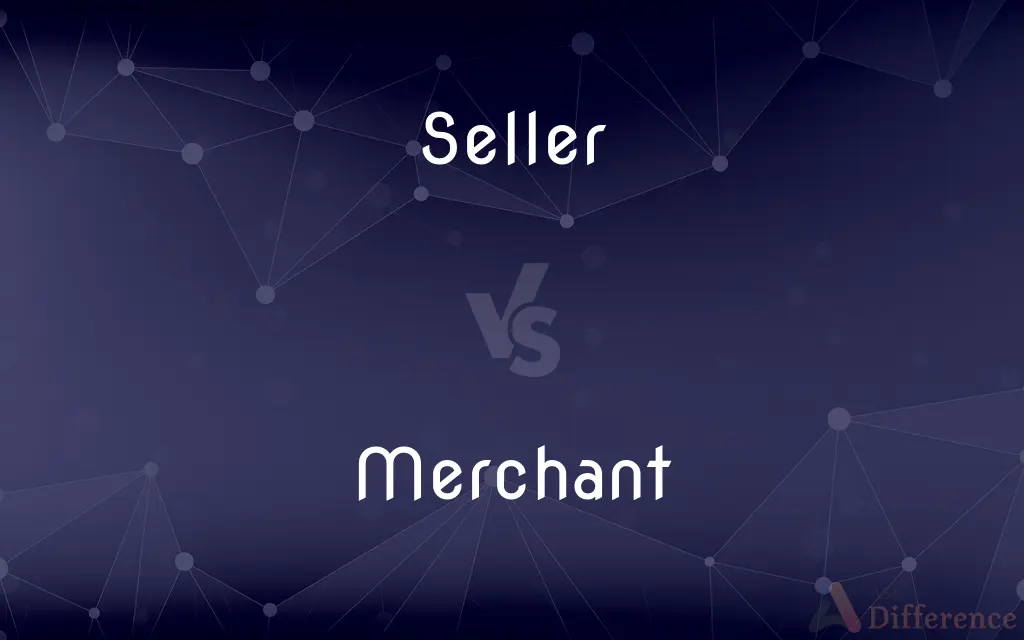Seller vs. Merchant — What's the Difference?
By Tayyaba Rehman & Fiza Rafique — Updated on March 25, 2024
A seller is anyone who offers a product or service for sale, while a merchant is a business or individual specializing in selling a particular product or service range.

Difference Between Seller and Merchant
Table of Contents
ADVERTISEMENT
Key Differences
A seller is broadly any individual or entity that provides goods or services to a buyer for payment. This term is wide-ranging, covering anyone from a person selling old furniture online to large corporations. Whereas, a merchant typically refers to an individual or company engaged in the retail or wholesale business, offering a specific range of products or services. Merchants are often associated with a business entity and possess a more defined market presence compared to general sellers.
Sellers can operate in both informal and formal marketplaces, meaning their activities might not always be tied to a registered business or a specific trade. For instance, someone selling homemade crafts at a local fair is considered a seller. On the other hand, merchants usually operate within formal marketplaces, often having physical stores or online platforms, and are recognized as official vendors of certain goods or services.
In terms of scale, sellers can range from small-scale individuals to large multinational companies. This allows for a broad interpretation of the term, making it applicable in various contexts. Conversely, merchants are typically envisioned on a slightly larger scale, usually implying a certain level of specialization and continuity in the trade of specific goods or services.
While sellers focus primarily on the act of selling, merchants might also be involved in additional aspects of the business such as procurement, inventory management, and marketing. This distinction points to the more comprehensive role merchants play in the market, not just as sellers but as integral parts of the supply chain.
The legal and tax implications for sellers and merchants can also differ. Sellers, especially casual or occasional ones, might not always face the same regulatory requirements as merchants. Merchants, due to their established business presence, are subject to a broader range of legal and tax obligations, reflecting their ongoing and structured nature of trade.
ADVERTISEMENT
Comparison Chart
Definition
Anyone who offers goods or services for sale.
A business or individual specializing in selling specific goods or services.
Scope of Operation
Can be informal or formal, individual or corporate.
Usually operates within a formal marketplace, with a business entity.
Scale
Ranges from small-scale individuals to large corporations.
Typically implies a larger scale with specialization.
Role in Supply Chain
Focuses on the act of selling.
Involved in procurement, inventory management, and marketing.
Legal and Tax Obligations
May vary, less for casual sellers.
More extensive, reflecting structured trade activities.
Compare with Definitions
Seller
Offers a wide range of products or services, not limited to specific categories.
Independent sellers often offer a diverse array of items based on personal interest or availability.
Merchant
Builds long-term relationships through branding and customer service.
Merchants use loyalty programs and after-sales services to retain customers.
Seller
Can operate in various markets, from online platforms to physical stores.
Sellers on e-commerce websites range from individuals to large companies.
Merchant
A business entity focused on selling specific ranges of products or services.
A merchant specializing in vintage books operates both a physical store and an online shop.
Seller
May face fewer legal obligations, depending on scale and frequency of sales.
Casual sellers at a garage sale typically don’t need a business license.
Merchant
Offers depth in a particular category of goods or services.
Electronic merchants provide a wide range of gadgets, from smartphones to accessories.
Seller
An individual or entity offering goods or services for sale.
A seller might list an old bicycle on an online marketplace.
Merchant
Usually has an established presence in a particular market or sector.
Merchants in the fashion industry often curate specific styles or brands.
Seller
Often direct, especially in informal settings or platforms.
Sellers on peer-to-peer platforms directly negotiate prices with buyers.
Merchant
Subject to comprehensive legal and tax requirements.
Merchants must comply with licensing, tax, and consumer protection laws.
Seller
A person who sells something
Street sellers of newspapers, flowers, etc.
Merchant
A merchant is a person who trades in commodities produced by other people, especially one who trades with foreign countries. Historically, a merchant is anyone who is involved in business or trade.
Seller
A product that sells in some specified way
The book became the biggest seller in the history of royal publishing
Merchant
A person or company involved in wholesale trade, especially one dealing with foreign countries or supplying goods to a particular trade
A builders' merchant
A tea merchant
Seller
One that sells; a vendor.
Merchant
A person who has a liking for a particular activity
His driver was no speed merchant
Seller
An item that sells in a certain way
This washing machine has been an excellent seller.
Merchant
(in historical contexts) relating to merchants or commerce
The growth of the merchant classes
Seller
Someone who sells; a vendor; a clerk.
Alisha was a seller of fine books.
Merchant
One whose occupation is the wholesale purchase and retail sale of goods for profit.
Seller
Something which sells.
Two of the books Alisha authored had become big sellers.
Merchant
One who runs a retail business; a shopkeeper.
Seller
Obsolete spelling of cellar
Merchant
Of or relating to merchants, merchandise, or commercial trade
A merchant guild.
Seller
One who sells.
Merchant
Of or relating to the merchant marine
Merchant ships.
Seller
Someone who promotes or exchanges goods or services for money
Merchant
A person who traffics in commodities for profit.
Merchant
The owner or operator of a retail business.
Merchant
A trading vessel; a merchantman.
Merchant
Someone who is noted for a stated type of activity or behaviour.
He's some kind of speed merchant — he drives way too fast.
Goal merchant Smith scored twice again in the match against Mudchester Rovers.
Merchant
(obsolete) A supercargo.
Merchant
As a resident of a region, to buy goods from a non-resident and sell them to another non-resident.
A merchanting service
Merchant
One who traffics on a large scale, especially with foreign countries; a trafficker; a trader.
Others, like merchants, venture trade abroad.
Merchant
A trading vessel; a merchantman.
Merchant
One who keeps a store or shop for the sale of goods; a shopkeeper.
Merchant
Of, pertaining to, or employed in, trade or merchandise; as, the merchant service.
Merchant
To be a merchant; to trade.
Merchant
A businessperson engaged in retail trade
Common Curiosities
Who can be considered a merchant?
A merchant is typically a business or individual that specializes in the retail or wholesale of specific goods or services, with a more formal market presence.
What are the main differences between sellers and merchants?
The main differences lie in scale, specialization, market presence, and legal obligations, with merchants usually having a more formal and specialized operation.
What defines a seller?
A seller is any individual or entity that offers goods or services for sale, regardless of the scale or formalities involved.
Do sellers and merchants face the same legal regulations?
No, merchants often face more extensive legal and tax obligations due to their structured and ongoing nature of trade.
Can a seller also be a merchant?
Yes, a seller can be a merchant if they operate a business specializing in specific goods or services.
What kind of products do sellers offer?
Sellers can offer a wide range of products or services, from handmade items to second-hand goods, without specializing in a particular category.
Is an individual selling online considered a seller or a merchant?
They are considered a seller, but if they operate a business specializing in certain goods or services, they could also be seen as a merchant.
How do merchants contribute to the economy?
Merchants stimulate economic activity by facilitating the sale and distribution of goods and services, creating jobs, and contributing to tax revenue.
What is the significance of specialization for merchants?
Specialization allows merchants to offer depth and variety in a specific category, enhancing their market presence and customer loyalty.
How does online selling affect the seller-merchant dynamic?
Online platforms have blurred the lines, allowing individuals (sellers) to scale up easily and adopt characteristics traditionally associated with merchants.
How do sellers and merchants interact with their customers?
Sellers may have direct, often informal interactions, while merchants focus on building long-term relationships through branding and service.
Can merchants be found in any industry?
Yes, merchants can specialize in any sector, from fashion and electronics to services like consulting or repair.
Are there informal merchants?
Typically, merchants operate within a more formal setting due to the nature of their business, but some small-scale merchants might appear informal while still focusing on specific goods.
Can both sellers and merchants operate globally?
Yes, both can operate globally, especially through online sales channels, but merchants often have a more structured approach to international markets.
Why might a seller not be considered a merchant?
A seller might not be considered a merchant if they lack a formal business structure, specialization, or a defined market presence.
Share Your Discovery

Previous Comparison
Hippo vs. Cow
Next Comparison
Ebb vs. TideAuthor Spotlight
Written by
Tayyaba RehmanTayyaba Rehman is a distinguished writer, currently serving as a primary contributor to askdifference.com. As a researcher in semantics and etymology, Tayyaba's passion for the complexity of languages and their distinctions has found a perfect home on the platform. Tayyaba delves into the intricacies of language, distinguishing between commonly confused words and phrases, thereby providing clarity for readers worldwide.
Co-written by
Fiza RafiqueFiza Rafique is a skilled content writer at AskDifference.com, where she meticulously refines and enhances written pieces. Drawing from her vast editorial expertise, Fiza ensures clarity, accuracy, and precision in every article. Passionate about language, she continually seeks to elevate the quality of content for readers worldwide.














































